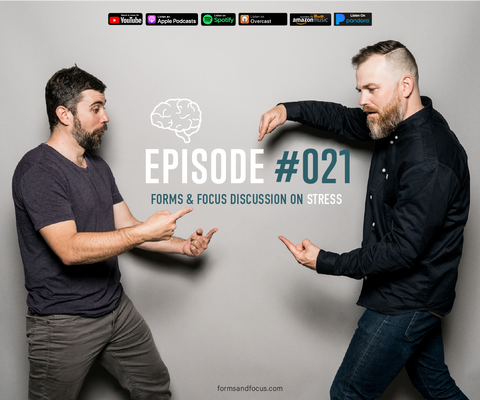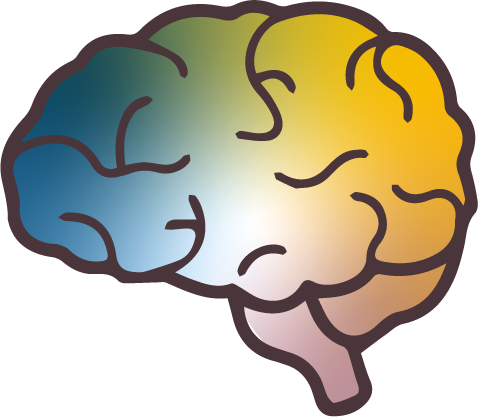
#21 Forms and Focus Discussion on Stress
THE DREAM KILLER.
Chronic stress can literally rewire your brain to focus on the wrong things, and over time, kill your dreams.
How Stress rewires your brain… Stress can influence what consumes your focus. This can reduce productivity & motivation for long-term goals, which can lead to depression, and eventually kill your dreams. But there is HOPE. Luckily our brains have neuroplasticity, which is the ability to change and adapt as a result of our experiences. You can essentially rewire your brain. And what better reason to do the work, to create new habits, to stand up for yourself and literally rewire your brain, so you can… accomplish your dreams.
On today's episode of the Forms and Focus Podcast (EPISODE #021), we are discussing focus and stress. And what you can do TODAY to reverse the effects of chronic stress on the brain, increase your focus on long-term goals and accomplish your dreams. Let’s dig in…
0:00 - Intro
1:25 - Problem - Stress is killing your focus.
7:26 - Solution/Habits for better focus.
LISTENT TO EPISODE
WATCH EPISODE
SHOW NOTES FOR EPISODE #21
PEOPLE ARE STRESSED
Stats form the American Psychological Assoc. & American Institute of Stress:
- 75% of adults report symptoms of stress, including headache, tiredness, or sleeping problems.
- 80% of U.S. workers say they experience stress on the job.
- 50% OF U.S. adults say that stress has negatively affected their behavior.
It is not getting better:
- Almost 80% of Americans reported that COVID-19 has caused stress.
- 77% of U.S. adults report feeling stressed over the future of the nation, up from 66% in 2019.
PROBLEM: CHRONIC STRESS REWIRES THE BRAIN
First, let’s take a look at what we pay attention to:
- According to The Neurochemistry of Focus, 2020, there are two types of attention, bottom up and top down.
-
The bottom up attention, sometimes called exogenous attention, is when your sensory world is driving what information you notice.
The loudest voice or brightest color “wins” so to speak and causes you to suddenly reorient your focus. Hang on to this thought: think about something as simple as a notification on your phone, to the media constantly reporting on pandemics, rage politics, death, war, racial tension, etc. - The “top down” attention, sometimes called endogenous attention. This is where it is your brain which is dictating and directing how you should be focusing your attention. It does so based on what you are trying to achieve at that particular moment in time as well as prior knowledge and experiences arising from your memory.
Now, let's look at what happens to the brain when you experience chronic stress:
-
In research from Bernstein (2021), when you experience chronic stress, the body makes more cortisol than it has a chance to release. Chronic stress has a shrinking effect on the prefrontal cortex, the area of the brain responsible for memory and learning.
While stress can shrink the prefrontal cortex, it can increase the size of the amygdala, which can make the brain more receptive to stress.
Christopher Bergland writes in Psychology Today. “Cortisol is believed to create a domino effect that hard-wires pathways between the hippocampus and amygdala in a way that might create a vicious cycle by creating a brain that becomes predisposed to be in a constant state of fight-or-flight,” - From Harvard Health (2021), Your brain isn't just a single unit, but a group of different parts that perform different tasks, says Dr. Ressler. Researchers believe that when one part of your brain is engaged, the other parts of your brain may not have as much energy to handle their own vital tasks, he says. For example, if you are in a dangerous or emotionally taxing situation, the amygdala may take over, leaving the parts of your brain that help to store memories and perform higher-order tasks with less energy and ability to get their own jobs done. "The basic idea is that the brain is shunting its resources because it's in survival mode, not memory mode," says Dr. Ressler.
- This is what appears to happen in the brain when it is under continuous stress: it essentially builds up the part of the brain designed to handle threats, and the part of the brain tasked with more complex thought takes a back seat.
Here is where it gets even worse:
- LeMoult (2020), Depression is associated with greater activation in areas of the brain associated with generating emotional responses to stressors (e.g., amygdala) and less activation in areas of the brain associated with regulating emotional responses to stressors (e.g., dorsolateral prefrontal cortex).
-
Depression is also associated with reduced connectivity between emotion-generating and emotion-regulating areas. Structural changes in this circuitry are also evidenced in depression and risk for depression. Not only do these neural abnormalities typify depressed and at-risk individuals, but also there is increasing evidence that they prolong distress and increase risk for the onset of depressive episodes.
To Summarize The Problem:
- Due to many outside circumstances and constant bombardment of negative inputs, we are pushed, bullied into a constant state of stress. This is literally rewiring and reinforcing our brains to stay in a constant state of fight or flight, reducing our memory mode, our deep thinking mode, and increasing our survival mode. The long-term effects include lack of motivation, depression, reduced social interaction, health problems and even death.
- Until we as a society completely revolt agianst this fucked up system we are in, it is up to us to take control of what we focus on, create new habits that rewire our brains, and start focusing on our dreams.
- So how do we do that?
SOLUTION
Turn Down your “bottom up” our exogenous attention.
- Reduce social media Pew Research Center, 2018 reported as many as 59% of teens report having experienced cyberbullying.
- American Journal of Preventive Medicine, 2017 reported that using platforms such as Instagram, Facebook, and Snapchat for more than two hours a day is associated with feelings of social isolation among individuals between ages 19 and 32.
- Journal of Affective Disorders, 2017 found that the more time young people spend using social media, the more anxiety symptoms they report experiencing.
Reduce the media
- Zaria Gorvett, BBC 2020, writes, Alison Holman and colleagues from the University of California studied the post crisis effects of the Boston Marathon bombing in 2013. Here is what’s crazy, another group had been even more badly shaken: those who had not seen the explosion in person, but had consumed six or more hours of news coverage per day in the week afterwards. Bizarrely, knowing someone who had been injured or died, or having been in the vicinity as the bombs went off, were not as predictive of high acute stress.
- Say goodby to toxic relationships.
Turn Up your “top down” endogenous attention.
- Meditate: (Williams, 2018) in New Scientist, Mindfulness meditation increased thickness in the prefrontal cortex and parietal lobes, both linked to attention control, while compassion-based meditation showed increases in the limbic system, which processes emotions, and the anterior insula, which helps bring emotions into conscious awareness. Perspective-taking training boosted regions involved in theory of mind.
- Apps like BrainFit
Read and Thinking Activities
- According to neuroscientist Susan Greenfield and her book Mind Change, when we read a novel, we read linearly, rather than sporadically jumping from tab to tab, and slowly think about the information in front of us. This exercise of taking time to process the narrative, to think about the complex layers of the story and how they fit together, actually increases the capacity for longer attention spans, especially in children.
- Mindfulness expert Jon Kabat-Zinn, in his masterclass, Mindfulness and Meditation, says, to strengthen your prefrontal cortex, participate in more thinking games, learning, cooking, and math.
Physical Sctivities
- (Tsujii et al., 2012), found that physical exercise improved behavioral performance of the working memory task compared with the control condition. Moreover, Near-infrared Imaging (NIRS) analysis showed that physical exercise enhanced the prefrontal cortex activity, especially in the left hemisphere, during the working memory task.
Get help from the right people.
- Go to counseling
- Add positive thinkers to your life
- Add problem solvers and strategist to your life
Works Cited
Bernstein, Rebecca. “The Mind and Mental Health: How Stress Affects the Brain.” Touro University Worldwide, 26 July 2016, https://www.tuw.edu/health/how-stress-affects-the-brain/. Accessed 21 March 2022.
Dershowitz, Scott. “Stress statistics 2022.” SingleCare, 20 01 2022, https://www.singlecare.com/blog/news/stress-statistics/. Accessed 21 March 2022.
“How the Prefrontal Cortex Affects Brain Function - 2022.” MasterClass, https://www.masterclass.com/articles/prefrontal-cortex-explained#what-are-the-parts-of-the-prefrontal-cortex. Accessed 22 March 2022.
LeMoult, Joelle. “From Stress to Depression: Bringing Together Cognitive and Biological Science.” PubMed, 29 December 2020, https://pubmed.ncbi.nlm.nih.gov/33343103/. Accessed 21 March 2022.
Pastore, Robert. “The Neurochemistry of Focus – PowerOnPowerOff.” PowerOnPowerOff, 10 May 2020, https://poweronpoweroff.com/blogs/longform/the-neurochemistry-of-focus. Accessed 21 March 2022.
Smith, Kathleen, and Allison Young. “Is Social Media Busting or Boosting Your Stress?” Everyday Health, 6 January 2022, https://www.everydayhealth.com/wellness/united-states-of-stress/social-media-busting-boosting-your-stress/. Accessed 22 March 2022.
T, Tsujii, et al. “Acute effects of physical exercise on prefrontal cortex activity in older adults: a functional near-infrared spectroscopy study.” PubMed, Adv Exp Med Biol., 2012, https://pubmed.ncbi.nlm.nih.gov/22879047/. Accessed 22 March 2022.
Trafton, Anne. “How the brain pays attention - MIT McGovern Institute.” McGovern Institute for Brain Research, 10 April 2014, https://mcgovern.mit.edu/2014/04/10/how-the-brain-pays-attention/. Accessed 21 March 2022.
Trombetta, Sadie. “What Does Reading Do To Your Brain? These 5 Effects Are Pretty Astounding.” Bustle, 11 August 2017, https://www.bustle.com/p/what-does-reading-do-to-your-brain-these-5-effects-are-pretty-astounding-74676. Accessed 22 March 2022.
Williams, Caroline. “Different meditation types train distinct parts of your brain.” New Scientist, 4 October 2017, https://www.newscientist.com/article/2149489-different-meditation-types-train-distinct-parts-of-your-brain/. Accessed 22 March 2022.
Comments (0)
There are no comments for this article. Be the first one to leave a message!